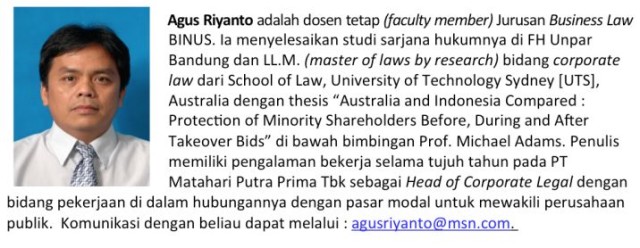THE POSITION OF MINORITY SHAREHOLDERS IN CORPORATE LAW
By AGUS RIYANTO (September 2016)
In corporate governance, generally there are two types of shareholder, namely majority shareholder and minority shareholder. Minority shareholders only own less than 50% of a company’s stocks. This makes them do not get a voting power to fully control the corporation. It is considered that such a weaker position of minority shareholders leads them to sustain suffer oppression in front of majority shareholders.
In terms of shareholder condition, how the law should balance the right between majority shareholder and the minority shareholder is a jural question. They are several principles can be accounted for to seek a special right in the minority shareholder (Tomasic & Bottomley, 1995). However, based on legal theory and practices they are three principles that indicate a minority shareholder in a vulnerable position. This brief essay will explain these principles based on common law perspective, especially as practiced in Australia, in order to view the position of a minority shareholder in corporate law.
The first principle to be discussed is the principle of majority-voting rule in the General Meeting of Shareholders (hereinafter referred to as “GMS”) (Boros, 1995). In legal practice, this rule creates a disadvantageous position for minority shareholders as it is highly probable that minority shareholders will be outvoted in a GMS. In terms of company ownership, majority shareholders are in a more powerful position and have greater control of the company. In contrast, the minority shareholders usually do not hold the necessary power to contest the board of directors and management, due to their relatively weaker voting position (Fung, 1995). It is possible, therefore, for majority shareholders to abuse their superior powers and influence decisions of the GMS for their own interests, such as by increasing their dividend entitlements or their voting power, whilst knowing that the minority shareholders are unable to challenge them.
The second principle is that of non-interference with the internal management of the company (Cook v. Deek, 1916). This principle developed as a result of the separate legal entity concept in Corporate Law, which states that a company is a separate legal entity to its owners. This concept has influenced the position of minority shareholders with respect to takeovers. In essence, the principle states that minority shareholders cannot be directly involved in the daily, routine management of the company (Xureb, 1989). As a logical consequence, minority shareholders cannot control the direction of the company, and, if there is a company decision that causes them damage, their only recourse is through a GMS, as it is the highest authority within the Company
Jennifer Hill (1992) in her article, points out an obstacle supplementary to the two principles previously mentioned. This third principle, which occurs in minority shareholder actions, is enshrined in Foss v Harbottle (1843) 2 Hare 461. That is, that minority shareholders are unable to take action against company management as a result of the proper plaintiff rule (Hollington, 1994). In a case where there is damage to the company, it is the company itself that must take action – the obligation to take action does not lie at the suit of minority shareholders. This principle also limits minority shareholders by controlling what may appear to be inappropriate actions of company management.
Thus, it can be seen how fragile the position of minority shareholders actually is. Consequently, minority shareholders are in a situation which calls for the granting of special rights which might then be codified in a set of legal rules to safeguard minority shareholders from the adverse effects of particular company decisions. The formulation of such specific provisions will act to minimise the adverse effects of any dispute that may arise between majority and minority shareholders, by balancing out the opposing interests of these two parties in a legally acceptable and transparent manner. In the case Parker v NRMA, Justice Kirby P expressed another reason why minority shareholders should have legal protection. He stated : “People who pursue a path of integrity, disturbing settled practices long established, generally accepted and widely regarded by those involved to be perfectly reasonable, tend – almost without exception – to invoke at first amusement, bemusement and then extreme irritation on the part of those conduct is questioned ……. [The judges] should support corporate gadflies when their cause is the correction of apparently unlawful and self-interested action by directors, defended by oppressive conduct” (see: Tomasic, R and Bottomley S., op.cit., at 419. 419). (***)
REFERENCES:
Boros, EJ, Minority Shareholders’ Remedies, Clareddon Press, 1995, at 200-201.
Cook v Deek (1916) 1 AC 554; Peters’ American Delicacy Co v Health (1939) 61 CLR 457.
Fung, GM, A Common Goal From Different Paths : Protection of Minority Shareholders in Delware and Canada (1993) 57 Albany Law Review 41.
Hill, J, Protecting Minority Shareholders and Reasonable Expectations (1992) 10 Companies and Securities Law Journal 88.
Hollington, R, Minority Shareholders’ Rights, 2nd Edition, London Sweet & Maxwell, 1994, 1t 103.
Tomasic, R and Bottomley, S, Corporation Law in Australia, The Federation Press, 1995, at 419.
Xuereb, PG, The Rights of Shareholders, BSP Professional Books, 1989, at 52-78.
Published at :




